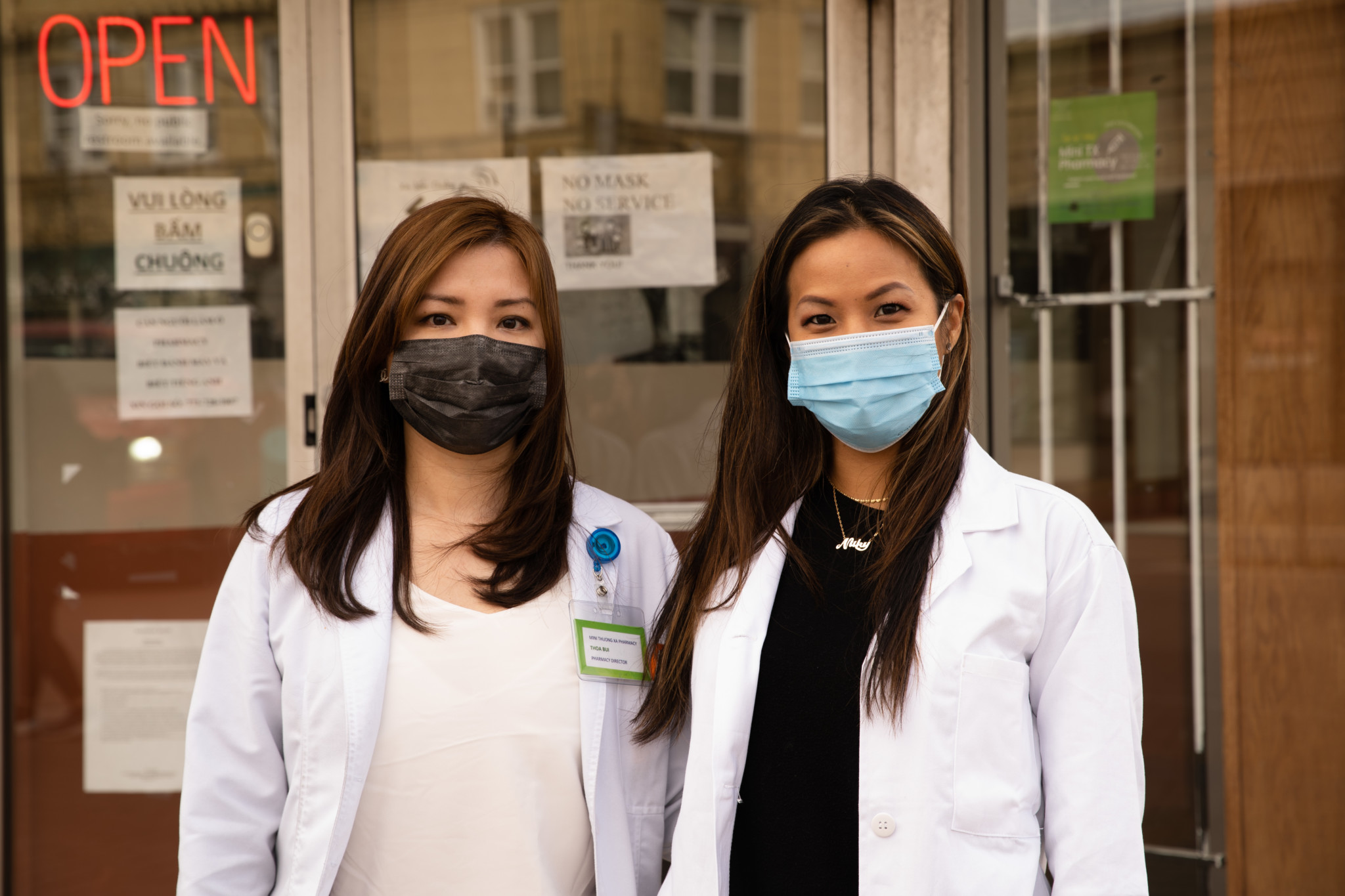At Wentworth Avenue near the Chinatown gate, a line wraps around the block waiting to enter the Pui Tak Center’s April 12 vaccination event. At the front door, staff welcome visitors in Cantonese and Mandarin and help them check in for their appointments as the line snakes up the stairs of the historic former On Leong Merchants Association Building. At every step, there is someone available to translate, explain the vaccination process, and answer any questions.
Karen Lee, assistant to the director of Pui Tak, floated around switching between Cantonese and Mandarin depending on the person. “Everyone that I’ve spoken with is so grateful,” Lee said. In the days leading up to the event, Lee, Pui Tak staff, and other community partners called as many as 800 people per day to let them know about it. This was the largest vaccination event to date that Pui Tak hosted, with over 450 shots administered.
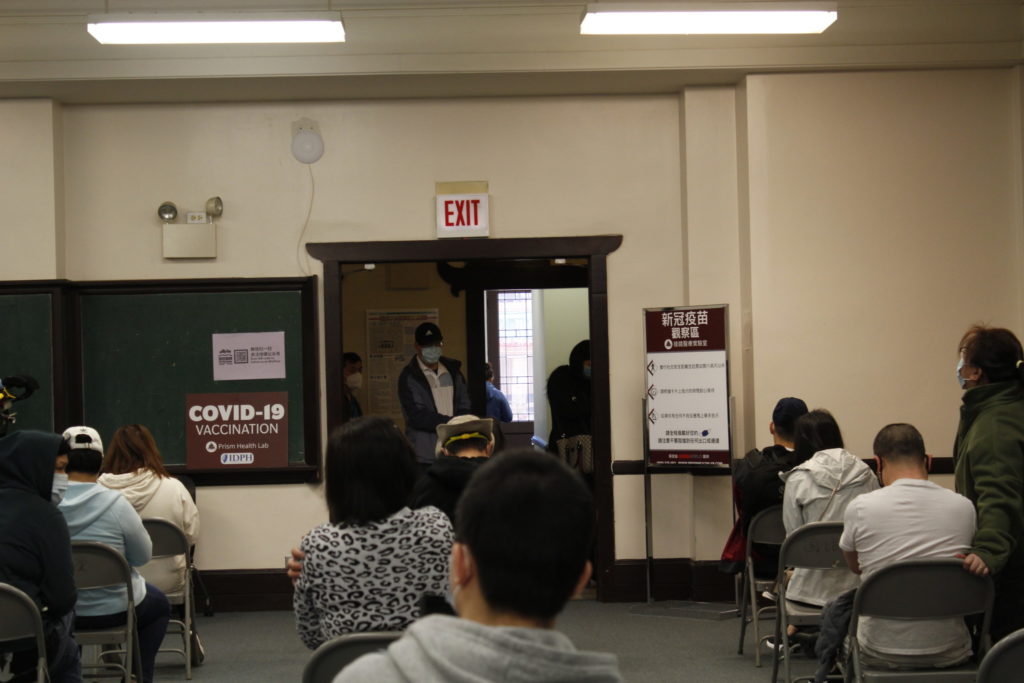
Community organizations have been vaccinating residents of the Chinatown area since February. About 2,000 people from Chinatown and nearby neighborhoods have received their vaccines here, according to David Wu, the executive director of Pui Tak Center, and 2,500 people and counting are on the waiting list for the next vaccination event.
Two recent vaccination events at Pui Tak Center targeted Chinatown restaurant and shop workers, who faced significant risks throughout the pandemic and are crucial for Chinatown’s business sector reopening.
“We don’t have any funding to do this,” said Wu. “But this is one of the really important things worth doing so that we could keep people safe… so that Chinatown can reopen the suffering businesses.”
While the city’s Protect Chicago Plus program targeted people living in certain vulnerable ZIP codes and people who are 65 and older, the ZIP codes where many Asian immigrants live were left out of the city plan to improve vaccination rates in these areas, Wu said.
Immigrants therefore rely largely on their neighborhood pharmacies and community organizations such as Pui Tak Center and Chinese American Service League (CASL) for vaccines, often due to language and technological barriers. “We wanted to be able to provide a location for seniors to come [who] couldn’t go to some of the sites that were only done in English or Spanish, or didn’t have the technology to be able to register themselves on the websites,” said Jered Pruitt, the chief operating officer of CASL, an organization that also serves the suburbs.
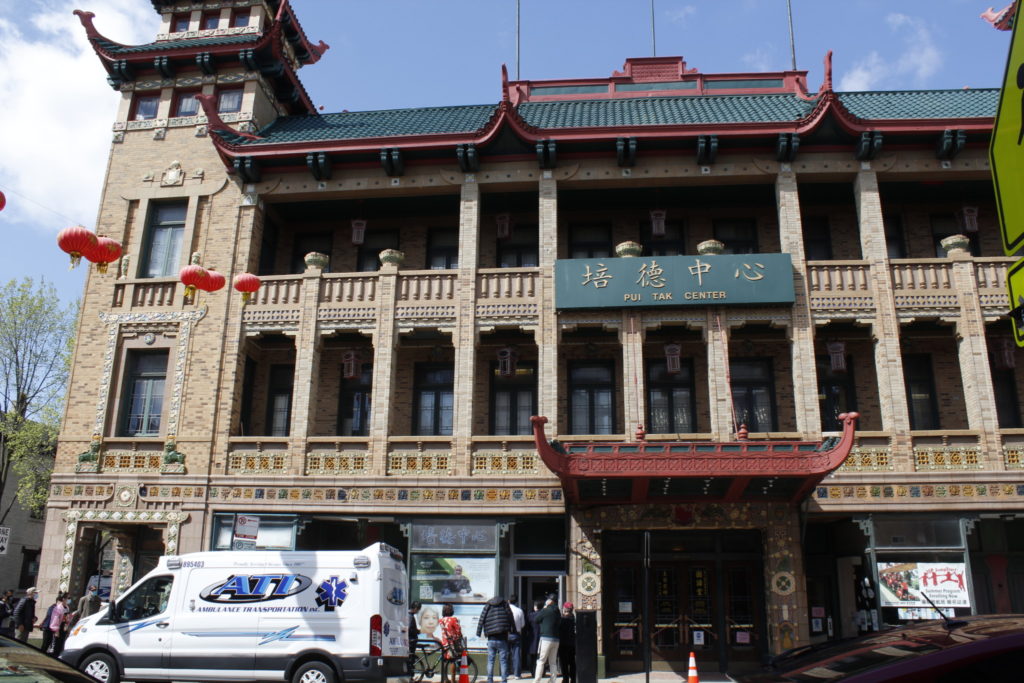
Twenty-two percent of the 54,197 residents living in the 60616 ZIP code are sixty and older, which is four percent more than the city’s average. The area is also where the business corridors of Chinatown are located, with a large population of food service workers and small business owners.
A Chinatown liaison for the 25th Ward Office said the office has collaborated with all the senior homes in Chinatown to distribute vaccines and continues to support Pui Tak’s vaccination efforts. The area is home to hundreds and thousands of first-generation immigrants, who are mostly seniors or frontline essential workers, and very often, have limited English proficiency, no access to internet, do not drive, or are without health insurance.
Asian immigrants face considerable language and technological barriers to vaccine access: Flyers about mass vaccination sites at the United Center and elsewhere are only available in English and Spanish, and there has been limited signage or interpreters for Cantonese and Mandarin speakers at the United Center vaccination site. When booking appointments through the COVID-19 vaccine hotline, some Spanish and Chinese-speaking 25th Ward residents have reportedly had difficulty obtaining interpreting services over the phone.
Lee said she’s heard from community members who had negative or confusing experiences at the city’s mass vaccination sites and ultimately left. Many preferred to wait for a spot at Pui Tak, closer to home than go to the United Center, she said.
The Chinatown liaison noted that those in the 60616 ZIP code can go to Saint Anthony Hospital near Douglass Park to receive the COVID-19 vaccine. However, residents often cannot find reliable transportation and must rely on family, friends, or volunteers from community organizations to get to vaccination sites outside of their neighborhood.
Wu said the center purposely made the vaccine registration form only available in Chinese, a measure he believes can prevent Pui Tak’s vaccine supply from going to people outside the Chinese-speaking population. For those who don’t have internet access, staff at Pui Tak walk them through the registration form over the phone.
The Chinatown liaison from the 25th Ward Office had heard little from the City regarding any plans for mass vaccination sites to be established in Chinatown.
The Bridgeport Free Clinic (BFC), run by a group of Asian American medical students from the University of Chicago Pritzker School of Medicine, plans to fill in the gaps. BFC focuses on providing free health services for the Asian American community. The group is currently partnering with the Asian Health Coalition to provide the vaccine supply for a future vaccination event in the Bridgeport/Greater Chinatown communities. Anthony Hung, co-director of the clinic, said, “What would be really helpful to our patients, especially those living in the Chinatown or Bridgeport areas, are more local vaccination events.”
With Chicago now in Phase 2, and all residents sixteen and older eligible to receive vaccination, both Pui Tak and CASL feel the need to speed up the process to get the most vulnerable inside the community vaccinated.
The complex and time-consuming process of getting the Chicago Department of Public Health approval, however, sometimes made it difficult for community organizations to have a set date for events like this. When asked when the next vaccination event would be, Pruitt said CASL is “actively working with healthcare partners and will have an update on vaccination availability very soon.” Wu also said that there’s a big demand for vaccines in the community, but they can only provide a limited number of vaccines at a time.
Across the city in Uptown, Jennifer Pham, co-owner of MiniTX Pharmacy (or Mini Thương Xá Pharmacy, Mini Mall in Vietnamese) and one of the founders of the community initiative Celebrate Argyle, has worked independently with Johnson & Johnson to obtain COVID-19 vaccines for area residents.
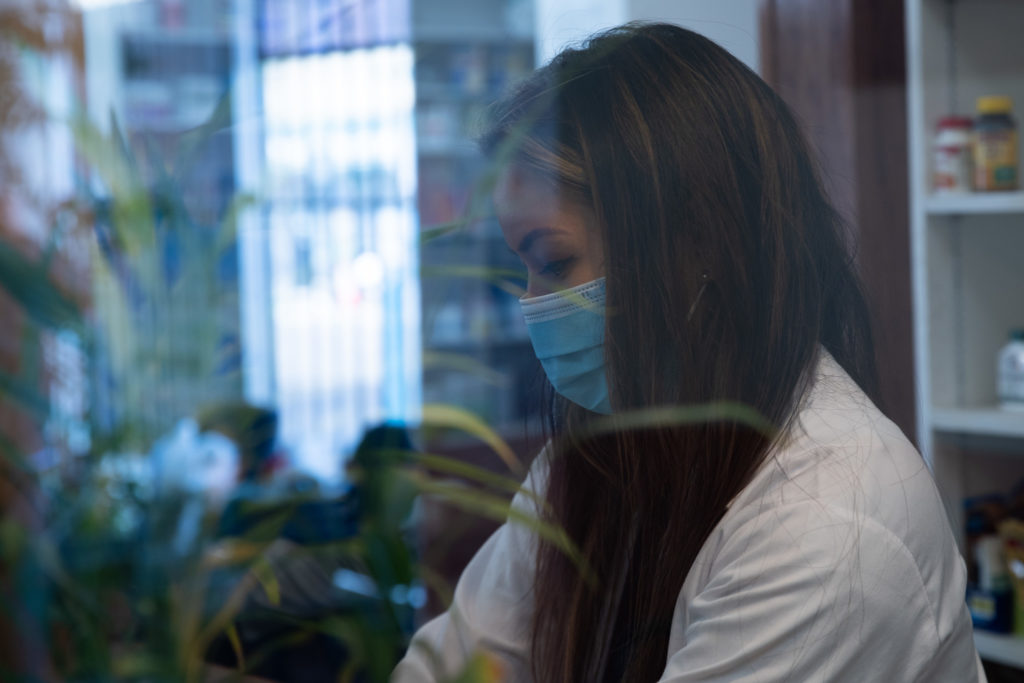
As the oldest Vietnamese business on Argyle St., MiniTX Pharmacy has served for years as a community center for Southeast Asian and Chinese immigrants. Pham said when her dad, Nam Pham, opened the business in 1983, he “wanted to provide as much as he could to the community.” MiniTX has always been a bit of everything; at various points in time the pharmacy had a video rental store, a jewelry store, and even a travel agency.
Today, the pharmacy continues Nam Pham’s legacy by administering the COVID-19 vaccine. “Our phone has been ringing off the hook,” said Pham. “We’ve been getting hundreds of messages on social media, and a lot of people are walking in to ask for appointments.”
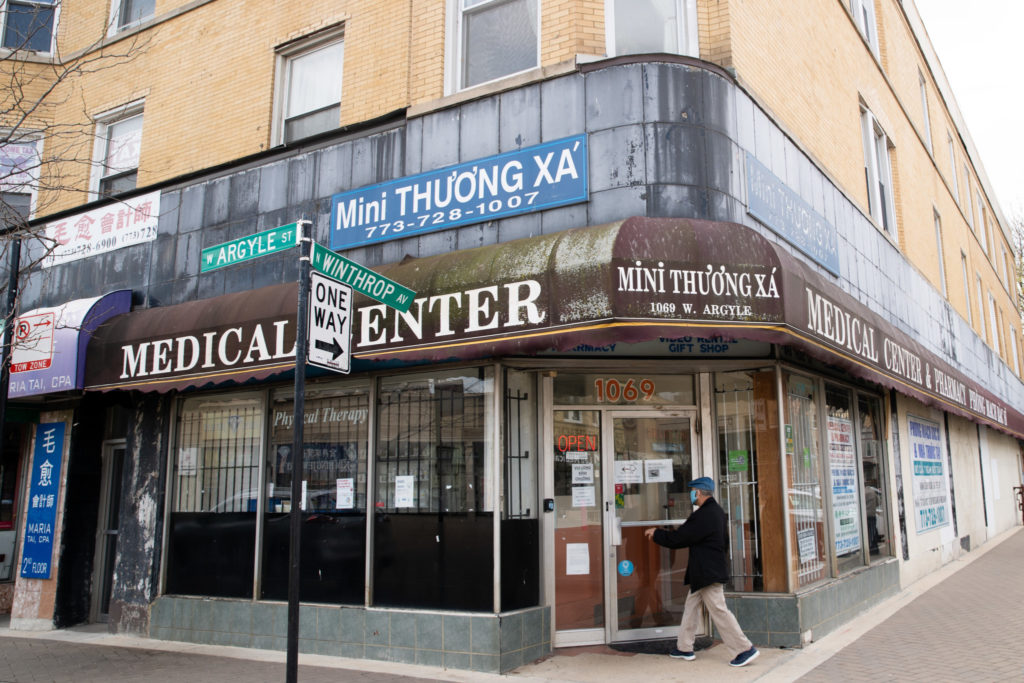
MiniTX’s small staff was quickly overwhelmed with the demand from local residents; eleven percent of the population in the 60640 ZIP code are of Asian descent. Pham said they needed to utilize their personal networks to recruit other pharmacists or nurses to administer the shots and multilingual volunteers to help patients fill out the paperwork. “It was beautiful to see the community coming together,” Pham said.
However, MiniTX has also struggled to figure out when future shipments from Johnson & Johnson would arrive. After reports surfaced of the very rare potential for dangerous blood clots to result from the J&J vaccine, MiniTX followed Centers for Disease Control and Prevention and the Food and Drug Administration’s recommendation needed to briefly pause the use of the single-dose vaccine. With the updated recommendations, they will continue administering the J&J vaccine.
When envisioning the future of her neighborhood, Pham said, “I see Argyle being a strong community where all of us know each other, take care of one another, and are stronger together.”
City data shows that more than fifty-four percent of Chicagoans of Asian descent have been fully vaccinated.
Linghua (Lily) Qi is a multimedia journalist based in Chicago. She previously collaborated with the Weekly on the Seeking Solidarity video series. Mallory Cheng is a freelance audio producer and reporter based in Bridgeport. Her work has appeared in The Anti-Racism Daily Podcast and The Gazette Chicago. She is also a City Bureau Documenter. She previously contributed to BoSS for Best of Chinatown 2020.

